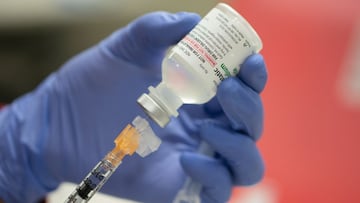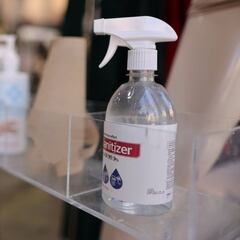Regulators allay fears after Bell's palsy cases in Pfizer covid-19 vaccine trial
Four people fell ill during a clinical trial for Pfizer but we also know that the frequency is in line with the trend in a normal population.

The fight against the novel coronavirus is entering a new phase, following news that several pharmaceutical companies have proven impressive efficacy with their vaccines. The first to announce was Pfizer/BioNTech, who confirmed 95% efficacy for their jab several weeks ago. Their vaccine was administered, for the very first time on Tuesday to a member of the public in the UK not involved in a clinical trial.
The Food and Drug Administration (FDA) is due to decide this week whether to give the green light for use of the Pfizer vaccine in the US. In the trials leading to the Pfizer vaccine’s rollout across the world this week, four out of 21,270 participants suffered from Bell’s Palsy. The US and UK regulators have dismissed fears over the incidence rate as nothing out of the ordinary given the expected occurrence in a normal population.
Bell's Palsy at the same rate as in the general population, no increase from the Covid vaccine?
— Community Collaborator (@blueforrule) December 9, 2020
Thank you, @pfizer, for developing this vaccine. https://t.co/kifJ1HdiEA
What is Bell’s palsy?
Bell’s palsy is a temporary paralysis of one side of the face, which causes muscles to droop downwards. Though it's believed to be the result of swelling or inflammation of the nerve that controls the muscles on one side of your face – often in reaction to a virus - the root cause of Bell’s palsy largely remains a mystery among the medical community. In some severe cases, both sides of the face can be affected. It is thought the syndrome affects 5,000 people every year and in the vast majority of cases a full recovery is made.
There have been some tentative reports that in rare cases, patients who contract covid-19 can go on to develop the syndrome as would be expected as an uncommon complication from any aggressive virus.
In trials conducted in the US for Pfizer / BioNTech’s vaccine, four of the 21,720 subjects who received the vaccine suffered Bell's palsy, but none of the 21,728 subjects in the placebo group. However, this is consistent with how common the viral reaction is in a random population, for instance the UK observes 20-30 cases of Bell's palsy in 100,000 people per year.
While a report on the US vaccine trial confirms that four individuals taking part in the study suffered cases of Bell’s palsy, there is no evidence to believe that the vaccine was responsible. “The observed frequency of reported Bell’s palsy in the vaccine group is consistent with the expected background rate in the general population, and there is no clear basis upon which to conclude a causal relationship at this time, but FDA will recommend surveillance for cases of Bell’s palsy with deployment of the vaccine into larger populations,” the FDA's report stated.
The sentiment was supported by the UK regulator the Medicines and Healthcare products Regulatory Agency (MHRA), who highlighted that "the general safety profile of this vaccine is similar to other types of routinely used vaccines,” and that “no vaccine would be authorised for supply in the UK unless the expected standards of safety, quality and efficacy are met.”
How did vaccine patients react to Bells palsy?
In the Pfizer trial the Bell’s palsy was the only side effect that affected those in the vaccine group and not the control group – those did not receive the live vaccine, rather a placebo. In the four affected patients, one developed Bell’s palsy within three days of vaccination and was fully recovered three days later.
Related stories
A second trial subject developed the syndrome nine days after being vaccinated, whereas the other two took longer to present symptoms, at 37 and 48 days respectively. All subjects had recovered to completely normal health by between 10 and 21 days later.
Six in trial die, four not given vaccine
In the FDA’s same report, the body highlighted that six people passed away during clinical trials. Of those six, two belonged to the vaccine group and the other four were in the control group, meaning that they were never given the vaccine. It has been confirmed that none of the six deaths during the clinical trial were related to the vaccine. The two that were administered the vaccine were both over 55 years old, one died of a heart attack 65 days after being given the second dose, and the other passed away due to arteriosclerosis three days following the first dose.


